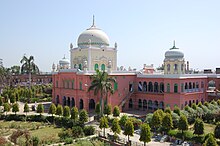ദയൂബന്ദി പ്രസ്ഥാനം
ഇന്ത്യയിലെ ഒരു ഇസ്ലാമിക പരിഷ്കരണസംഘടനയാണ് ദയൂബന്ദി പ്രസ്ഥാനം (ഹിന്ദി: देवबन्दी; Pashto and പേർഷ്യൻ: دیوبندی; ഉർദു: دیوبندی; അറബി: الديوبندية; ബംഗാളി: দেওবন্দি ; ഒറിയ: ଦେଓବନ୍ଦି)
| Deobandi |
|---|
| Darul Uloom Deoband Logo.svg |
| ആകെ ജനസംഖ്യ |
| സ്ഥാപകൻ |
| Regions with significant populations |
| മതങ്ങൾ |
| Sunni Islam |
| വിശുദ്ധ ഗ്രന്ഥങ്ങൾ |
| Quran, Hadith, and Sunnah |
| ഭാഷകൾ |

ദയൂബന്ദ് പ്രദേശത്ത് രൂപപ്പെട്ട ദാറുൽ ഉലൂമിനെ
ചുറ്റിപ്പറ്റിയാണ് ദയൂബന്ദി പ്രസ്ഥാനം രൂപപ്പെടുന്നത്.. [1] [2] ഹനഫി കർമ്മശാസ്ത്രസരണിയാണ് സംഘടന പിന്തുടരുന്നത്.[3] സംഘടനയുടെ രാഷ്ട്രീയവിഭാഗമായാണ് ജംഇയ്യത്തുൽ ഉലമയെ ഹിന്ദ് രൂപപ്പെട്ടത്. [4] [5]
ദിയോബന്തി ( Fijian Hindustani: देवबन्दी ; പഷ്തു ആൻഡ്
പേർഷ്യൻ: دیوبندی ; ഉർദു: دیوبندی ; അറബി: الديوبندية ; ബംഗാളി: দেওবন্দি ; ഒറിയ: ଦେଓବନ୍ଦି ) സുന്നിയിലെ ഒരു ഇസ്ലാമിക പുനരുജ്ജീവന പ്രസ്ഥാനമാണ് (പ്രാഥമികമായി ഹനഫി ) ഇസ്ലാം പത്തൊൻപതാം നൂറ്റാണ്ടിന്റെ അവസാനത്തിൽ ഇന്ത്യയിലെ ദിയോബന്ദ് പട്ടണത്തിലെ ദാരുൽ ഉലൂം ഇസ്ലാമിക് സെമിനാരിക്ക് ചുറ്റും രൂപംകൊണ്ടതാണ് 1857–58 ലെ ഇന്ത്യൻ കലാപത്തിന് എട്ട് വർഷത്തിനുശേഷം [8] 1866 ൽ മുഹമ്മദ് കാസിം നാന ut ട്ടവി, റാഷിദ് അഹ്മദ് ഗംഗോഹി, മറ്റ് നിരവധി വ്യക്തികൾ എന്നിവരാണ് സെമിനാരി സ്ഥാപിച്ചത്; [9] [10] [11] [12] ദിയോബണ്ടി പ്രസ്ഥാനത്തിന്റെ രാഷ്ട്രീയ വിഭാഗമായ ജാമിയത്ത് ഉലമ-ഇ-ഹിന്ദ് 1919 ൽ സ്ഥാപിതമായതും സംയോജിത ദേശീയതയുടെ സിദ്ധാന്തം പ്രചരിപ്പിക്കുന്നതിലൂടെ ഇന്ത്യൻ സ്വാതന്ത്ര്യസമരത്തിൽ ഒരു പ്രധാന പങ്ക് വഹിച്ചു
ദൈവശാസ്ത്രപരമായി, ദിയോബാൻഡിമാർ തക്ലിദിന്റെ സിദ്ധാന്തം (നിയമപരമായ മുൻഗണനയ്ക്ക് അനുസൃതമായി) ഉയർത്തിപ്പിടിക്കുകയും ഹനഫി സ്കൂളിനോട് യോജിക്കുകയും ചെയ്യുന്നു. [13] ദിയോബണ്ടി സ്കൂളിന്റെ സ്ഥാപകരായ മുഹമ്മദ് കാസിം നാന ut ട്ടവി, റാഷിദ് അഹമ്മദ് ഗംഗോഹി എന്നിവർ ഇസ്ലാമിക പണ്ഡിതന്റെയും മുജാദിദ് ഷാ വാലിയുല്ലയുടെയും വഹാബി പ്രത്യയശാസ്ത്രത്തിന്റെയും മത-രാഷ്ട്രീയ സിദ്ധാന്തത്തിൽ നിന്ന് പ്രചോദനം ഉൾക്കൊണ്ടിരുന്നു. [8] ആദ്യ വർഷങ്ങളിൽ, ദിയോബണ്ടി സ്കൂൾ ക്രിസ്ത്യൻ, ഹിന്ദു പണ്ഡിതന്മാരുമായി സമാധാനപരമായ രീതിയിൽ സംവാദത്തിൽ [9] അതിന്റെ സ്ഥാപനത്തിന്റെ പ്രാരംഭ ഘട്ടത്തിൽ പ്രവർത്തനച്ചെലവുകൾ ഭാഗികമായി ഹിന്ദുക്കൾ വഹിച്ചിരുന്നുവെന്ന് പറയപ്പെടുന്നു, കാരണം അക്കാലത്തെ ദിയോബണ്ടി തത്ത്വചിന്തകർ ഹിന്ദുക്കളുടെയും ക്രിസ്ത്യാനികളുടെയും മുസ്ലിംകളുടെയും ഐക്യം, മൾട്ടി കൾച്ചറിസം, ഇന്ത്യ വിഭജനത്തോടുള്ള എതിർപ്പ് എന്നിവയെക്കുറിച്ച് സംസാരിച്ചു. [14]
അവലംബം
- ↑ Puri, Luv (3 November 2009). "The Past and Future of Deobandi Islam". CTC Sentinel. 2 (11). West Point, New York: Combating Terrorism Center: 19–22. Retrieved 15 September 2020.
- ↑ Asthana, N. C.; Nirmal, Anjali (2009). Urban Terrorism: Myths and Realities. Jaipur: Shashi Jain for Pointer Publishers. p. 66. ISBN 978-81-7132-598-6. Retrieved 8 September 2020.
- ↑ Ingram, Brannon D. (2018). Revival from Below: The Deoband Movement and Global Islam. Oakland: University of California Press. ISBN 9780520298002. LCCN 2018014045. Retrieved 8 September 2020.
- ↑ Barbhuiya, Atiqur Rahman (27 January 2020). Indigenous People of Barak Valley (in ഇംഗ്ലീഷ്). Notion Press. ISBN 978-1-64678-800-2.
Muslim politics in India opened a new chapter after the formation of Jamiat Ulema-e-Hind in 1919 A.D. under the initiative of Ulemas of Deoband. It was founded by the dedicated freedom figher Sheikh-Ul-Hindi Maulana Mahmudul Hasan of Darul-Uloom, Deoband. Jamiat played a very active role in India's freedom struggle.
- ↑ Ali, Asghar (9 April 2011). "Islamic identity in secular India". The Milli Gazette (in ഇംഗ്ലീഷ്).
The Ulama of Deoband opposed partition and stood by united nationalism. Maulana Husain Ahmad Madani, then chief of Jami'at-ul-Ulama-i-Hind, wrote a tract Muttahida Qaumiyyat aur Islam i.e., the Composite Nationalism and Islam justifying composite nationalism in the light of Qur'an and hadith and opposing Muslim League's separate nationalism. While the educated elite were aspiring for power and hence wanted their exclusive domain; the Ulama's priority was an independent India where they could practice Islam without fear or hindrance.
- ↑ Barbhuiya, Atiqur Rahman (27 January 2020). Indigenous People of Barak Valley (in ഇംഗ്ലീഷ്). Notion Press. ISBN 978-1-64678-800-2.
Muslim politics in India opened a new chapter after the formation of Jamiat Ulema-e-Hind in 1919 A.D. under the initiative of Ulemas of Deoband. It was founded by the dedicated freedom figher Sheikh-Ul-Hindi Maulana Mahmudul Hasan of Darul-Uloom, Deoband. Jamiat played a very active role in India's freedom struggle.
- ↑ Ali, Asghar (9 April 2011). "Islamic identity in secular India". The Milli Gazette (in ഇംഗ്ലീഷ്).
The Ulama of Deoband opposed partition and stood by united nationalism. Maulana Husain Ahmad Madani, then chief of Jami'at-ul-Ulama-i-Hind, wrote a tract Muttahida Qaumiyyat aur Islam i.e., the Composite Nationalism and Islam justifying composite nationalism in the light of Qur'an and hadith and opposing Muslim League's separate nationalism. While the educated elite were aspiring for power and hence wanted their exclusive domain; the Ulama's priority was an independent India where they could practice Islam without fear or hindrance.
- ↑ 8.0 8.1 Syed, Jawad; Pio, Edwina; Kamran, Tahir; Zaidi, Abbas, eds. (2016). Faith-Based Violence and Deobandi Militancy in Pakistan. Basingstoke: Palgrave Macmillan. p. 139. doi:10.1057/978-1-349-94966-3. ISBN 978-1-349-94965-6. LCCN 2016951736. Retrieved 8 September 2020.
Some prominent founders of the Darul Uloom Deoband, such as Muhammad Qasim Nanautavi and Rashid Ahmad Gangohi, drew further inspiration from the religiopoliticial concept of Shah Waliullah, as well as from Wahhabi ideology, and they set up an Islamic seminary at Deoband in UP on 30 May 1866.
- ↑ 9.0 9.1 Puri, Luv (3 November 2009). "The Past and Future of Deobandi Islam". CTC Sentinel. 2 (11). West Point, New York: Combating Terrorism Center: 19–22. Retrieved 15 September 2020.
- ↑ Asthana, N. C.; Nirmal, Anjali (2009). Urban Terrorism: Myths and Realities. Jaipur: Shashi Jain for Pointer Publishers. p. 66. ISBN 978-81-7132-598-6. Retrieved 8 September 2020.
- ↑ Ingram, Brannon D. (June 2009). "Sufis, Scholars, and Scapegoats: Rashid Ahmad Gangohi (d. 1905) and the Deobandi Critique of Sufism". The Muslim World. 99 (3). Chichester, West Sussex: Wiley-Blackwell: 478–501. doi:10.1111/j.1478-1913.2009.01281.x. Retrieved 8 September 2020.
- ↑ Lewis, B.; Pellat, Ch.; Schacht, J., eds. (1991) [1965]. Encyclopaedia of Islam. Vol. 2 (2nd ed.). Leiden: Brill Publishers. p. 205. ISBN 90-04-07026-5.
- ↑ Metcalf, Barbara Daly (2002). Islamic revival in British India: Deoband, 1860–1900 (3rd impression. ed.). New Delhi: Oxford Univ. Press. p. 141. ISBN 0-19-566049-8.
- ↑ Ali, Asghar (9 April 2011). "Islamic identity in secular India". The Milli Gazette (in ഇംഗ്ലീഷ്).
The Ulama of Deoband opposed partition and stood by united nationalism. Maulana Husain Ahmad Madani, then chief of Jami'at-ul-Ulama-i-Hind, wrote a tract Muttahida Qaumiyyat aur Islam i.e., the Composite Nationalism and Islam justifying composite nationalism in the light of Qur'an and hadith and opposing Muslim League's separate nationalism. While the educated elite were aspiring for power and hence wanted their exclusive domain; the Ulama's priority was an independent India where they could practice Islam without fear or hindrance.